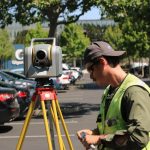
What began nearly 3,000 years ago during the rise of the Egyptian pyramids and introduction of infrastructure has grown into one of the most crucial career paths across the globe. The task of land surveying is one that demands precision, experience, and a solid understanding of science, mathematics, and engineering principles.
For those willing to commit themselves to this career path, compensation is generous, employment is solid, and opportunity for growth and expansion exists. With that being said, it’s surprising how little is known about this vital career segment, and how crucial it is for any development or construction-based project.
Land Surveying: Why is it important?
Land surveying provides a foundation on which to develop roads, build bridges, and new buildings. It’s one of Australia’s oldest and most important professions. In fact, the office of Surveyor General is second in longevity, with only the New South Wales Governor surpassing this title.
In the past, surveying in Australia was completed to outline boundaries of the land grant process during European colonial expansion. As more people began to settle, the role of land surveying expanded to measuring and reporting geographic landscape for developing infrastructure such as water ways, housing, and the first business locations for dry goods, building supplies, and more.
Today, land surveying is used daily, as an initial process completed before planning any development project. They use advanced technology from aerial drones to GPS satellite and software to measure, analyse and outline geographic facts that are used to build dams, powerplants, outline fibre optic cables, and every building constructed. Without land surveying, no roads would be built, new stores would not exist, and infrastructure would crumble.
The role of surveying land
The process of land surveying is generally the first step in any new development or construction-related project. The data gathered by land surveyors is sent to architects, engineers, and other developers who design the plans for construction. These plans include the details for digging into earth, pouring concrete pads or foundations, which permit buildings, roads, and all buildings to stand on solid ground.
They are hired by individuals, corporations, and government agencies to complete land surveying projects across Australia and the globe. Surveyors are used prior to the redevelopment or renovation of any road, infrastructure, or building. This helps to determine if there has been any geological shift in the lay of the land, the flow of water, or elevations. The data is then forwarded to developers and engineers to make adjustments to blueprints and construction details to comply with changes.
Today’s land surveyor works with others in the engineering field, such as those who build bridges, sewage systems, farming, architects, geologists, and government or military officials. In fact, many government agencies or military branches have in-house land surveyors who work abroad, to help improve the infrastructure for underdeveloped countries. Insurance for land surveyors is also available, including professional indemnity.
When is land surveying used?
Land surveying is often considered to be a proactive process that should be completed before any new construction or development project is begun. But this is not always the case. In fact, land surveying is typically required when enhancements or redevelopment of existing buildings, roads, and other infrastructure is planned.
Case in point, when a city or metropolitan area is considering repaving a highway or city road, surveyors will complete due diligence to verify that the geological plane (or the outlay of the earth) has not shifted. If it has, the land surveyors will relay this data to engineers and other developers, who will make subtle changes to their plans to improve drainage, efficiency, or smoothness of the road.
Land surveying is also required in many providences or cities that have building codes on refurbishing or remodelling residential or commercial properties. In this situation, the property owner or an architect acting on their behalf will hire the surveyor privately to complete this important task.
Environmental factors including landscaping, natural streams, trees, and brush are often factored as well by a land surveyor. This ensures that any new development or construction does not pose a risk to the environment.
What is the cost of hiring a land surveyor?
Like any other profession, the cost of hiring a land surveyor changes based on supply and demand. Fees for this specialised task can range from a few hundred dollars to six-figures depending on the conditions, locations, availability of other qualified candidates, and of course, the scope of the project. Generally, the average private or residential land surveyor project is budgeted close to $500.
Those who are looking to hire a surveyor should consider the following factors:
- Location of the project: When an area is obstructed or hazardous for the land surveyor to work, cost tends to be elevated. Availability to use their tools such as GPS satellite or drone technology may also impact the cost.
- Size or scope of the project: Like any other industry, the size or scope of the project is also a critical component to determining the cost.
- Time of travel: If a land surveyor is required to work in an area that requires copious travel, the customer is likely required to cover travel expenses to and from the project.
Land surveying has come a long way since those early Egyptian development projects. It’s an industry that continues to thrive due to the continual changes in our environment, shifting of our planet core, and other factors outside of our control. As long as there are roads to maintain, water ways to repair, and buildings to construct, there will be a need for professional land surveyors.


